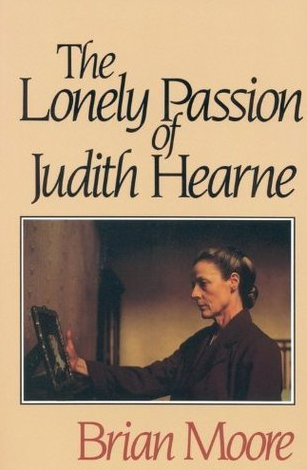
I finished Brian Moore’s The Lonely Passion of Judith Hearne two weeks ago, but am still not sure how to write about it. My reaction to it was very strong; it even gave me nightmares. I wonder if I can do it justice as there’s so much to discuss. It’s excellent and multifaceted and has a lot to say about religion, spinsterhood, family duty, shattered dreams and the woes of being an unattractive woman.
It’s peculiar that after having written two reviews about women who were punished for being too beautiful (Asking For It and Little Deaths), I’m now writing about a book in which the main character suffers, among other things, from being unattractive. Clearly, it’s hard to be a woman.
Judith Hearne is a 40-something spinster who has lived a rather dull and lonely life. Out of a sense of family duty and fueled by her religious beliefs, she has cared for an ailing aunt until her death. The aunt in question was a rather formidable person and Judith lived under her thumb. Caring for her took up all of Judith’s time. It made it impossible to find love and friendship and now, at 40, she thinks it’s over. Even in her youth she wasn’t good-looking and sadly, age hasn’t made her look interesting. Not yet.
Here’s what she thinks about herself:
She watched the glass, a plain woman, changing all to the delightful illusion of beauty. There was still time: for her ugliness was destined to bloom late, hidden first by the unformed gawkiness of youth, budding to plainness in young womanhood and now flowering to slow maturity in her early forties, it still awaited the subtle garishness which only decay could bring to fruition: a garishness which, when arrived at, would preclude all efforts at the mirror game.
At the beginning of the novel, Judith Hearne has just moved into new lodgings in a shabby boarding house in Belfast. Here’s how the novel begins:
The first thing Miss Judith Hearne unpacked in her new lodging was the silver-framed photograph of her aunt. The place for her aunt, ever since the sad day of the funeral, was on the mantel piece of whatever bed-sitting-room Miss Hearne happened to be living in. And as she put her up now, the photograph eyes were stern and questioning, sharing Miss Hearne’s own misgivings about the condition of the bed-springs, the shabbiness of the furniture and the run-down part of Belfast in which the room was situated.
After she has found a place for her aunt’s picture, she needs to find another one for the Sacred Heart. This beginning shows exactly what kind of person Judith Hearne is. She’s poor and single and the two only things that give her solace are the memory of her aunt and her religion. And a few possessions of value like a watch and pretty shoes with buttons that look like winking eyes.
Judith Hearne is a piano teacher with only a few pupils left. One of the reasons she’s losing pupils is only discovered later in the novel—when things get too stressful, she drinks. Her good education and valuable belongings, catch the eye of one of the other boarders, Mr Madden, the brother of her landlady. Unfortunately, poor Judith thinks he’s really interested. She knows her time is running out and seeing how kind Mr Madden is with her and how he likes to talk to her, gives her hope.
And maybe, although it was a thing you could hardly bear to think about, like death or your last judgment, maybe he would be the last one ever and he would walk away now and it would only be a question of waiting for it all to end and hoping for better things in the next world. But that was silly, it was never too late.
It soon becomes clear that Mr Madden is looking for a business partner, not for a wife. He’s returned from America where he has lived for a long time. According to Miss Hearne, he’s more American than Irish. He lacks manners and dresses differently. If she was honest to herself and not so desperate, she would have to admit that he’s not her type.
Being single might not have been as bad for Judith Hearne if she had friends and family but she doesn’t. There’s only one family she calls her friends, the O’Neill’s. Judith pays them a visit every Sunday. It’s the highlight of her week. She tells herself that they are like family, that the O’Neill kids are like her grandchildren. And she’s sure that they look forward to seeing her too, after all, she goes there well prepared.
For it was important to have things to tell which interested your friends. And Miss Hearne had always been able to find interesting happenings where other people would find only dullness. It was, she often felt, a gift which was one of the great rewards of a solitary life. And a necessary gift. Because, when you were a single girl, you had to find interesting things to talk about. Other women always had their children and shopping and running a house to chat about. Besides which, their husbands often told them interesting stories. But a single girl was in a different position. People simply didn’t want to hear how she managed things like accommodation and budgets. She had to find other subjects and other subjects were mostly other people. So people she knew, people she had heard of, people she saw in the street, people she had read about, they all had to be collected and gone through like a basket of sewing so that the most interesting bits about them could be picked out and fitted together to make conversation.
Brian Moore uses stream-of-consciousness and various points of view to give us an insight into most of his characters thinking. That’s why we know that nobody in this novel thinks kindly about Judith Hearne. Seeing the O’Neill’s before Judith’s arrival on one Sunday is enlightening. Moore is brilliant at unmasking his characters’ feelings and thoughts and knowing what they think and comparing it to what she thinks they think is chilling.
Before moving into this boarding house, Judith Hearne isn’t happy but once things go wrong with Mr Madden, she heads for a crisis. A crisis that unhinges her, because she pretty much loses everything including her faith. The end of the novel, which I won’t describe, tells us how she moves on, after having lost her faith and her illusions.
Different readers will find different things interesting in this book. As someone who was born into a Catholic family, I found the religious aspects especially perturbing.
Just before starting the book, I saw the title of an article about the pope saying he thought it was better to be an atheist than a hypocritical Christian. I couldn’t help but think of this while reading The Lonely Passion of Judith Hearne, a book that is, among other things, very much about just that – religious hypocrisy.
Being rejected by a man, is painful but being let down by her religion and its representative, a priest, is far worse for Judith Hearne.
It’s not often that a title is so well-chosen or that it does double duty like in the case of Moore’s eponymous title. Yes, the book is about loneliness, and it’s about the last hope to find love. But it’s also a description of utter despair and suffering and that’s alluded to in the title as well. After all, “passion” is also a reference to the “passion of the Christ” or his final suffering and martyrdom. We find in this book the same doubts, the same “why have you forsaken me feeling”, only Judith Hearne, being human, has another fate awaiting her.
Before ending, I’d like to say a few words about confession. There’s a heartbreaking scene in this novel, in which Judith Hearne goes to confession. She goes to confess her sin – drinking – but also because she hopes for spiritual help. The scene reminded me of one of Frank O’Connor’s amazing short stories First Confession.
This is a bit of a hodgepodge review and I’m sorry for that. It’s an excellent novel but it reminded me of so much, that it was hard to write about it coherently and I didn’t want to turn this into a memoir piece, telling you all about me and why I left the church. Maybe I’ll do that in another post some day.
The Lonely Passion of Judith Hearne is an excellent novel because Moore is astute. The characters are brilliantly drawn and explored. We see all of their foibles which, at times, is quite funny. The ending however was heartbreaking.

This post is a contribution to Cathy’s and Raging Fluff’s Reading Ireland Month.
